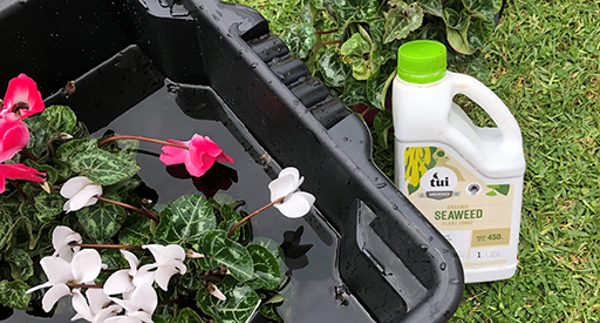
Feed your garden and it will feed you! For continuous delicious harvests and beautiful blooms in your backyard, a feeding regime with quality products is the key to success. We’ve put together our top nutrition tips to keep your garden growing its best.
Reap the rewards with regular feeding…
Plants use nutrients from the soil as they grow, so replenishing the nutrients ensures your plants grow to their full potential and you get maximum yields and long lasting crops. A well nourished garden will also have a better chance of keeping insects and diseases at bay.
All you need to feed your garden…
With a range of fertilisers available it can be hard to know where to start, so we’ve covered the main types of fertiliser to help you on your way to garden success. For optimum garden growth a combination of soil conditioners, fertiliser and plant tonic should be used.
SHEEP PELLETS
Benefits: sheep pellets benefit both your soil and plants, conditioning your soil and providing nutrients for your growing plants. They break down over time to add organic matter to improve soil structure, encourage earthworms, and nourish your plants.
Consideration: Sheep pellets take time to break down and release the nutrients for your soil and plants, so it’s a good idea to pair with a slow release or speciality granular fertiliser.
SEAWEED
Benefits: provides a natural source of seaweed to promote healthy plant and root growth to make plants more resilient to common problems including: frost, heat, pests and diseases. Seaweed is also suitable for all areas of your garden and can be used year-round. As a plant tonic it doesn’t have an NPK, so you can’t over feed your plants! Tui Organic Seaweed Plant Tonic is Bio Gro certified so is a great natural option for feeding your plants.
Consideration: Plant tonics don’t have an NPK so you will need to pair with a fertiliser that has an NPK for optimum feeding.
WORM FARMS
Benefits: provides free and natural fertiliser for your plants. You can make it yourself at home by recycling your kitchen scraps into rich fertiliser for your garden in the form of worm castings and worm tea. Dilute your worm tea with water at a 1:10 ratio and feed your whole garden with your homemade fertiliser.
Consideration: it takes time for food to break down to create the worm castings and worm tea to feed your garden, and also time to maintain the worm farm.
LIQUID FERTILISER
Benefits: Liquid fertilisers are fast acting, usually in a concentrate that is mixed and diluted with water and applied around the drip line or the soil around plants. Liquid fertilisers are more water soluble, fast acting and a great way to feed plants that may need a boost in summer. Liquid fertilisers can be used as a supplementary or additional fertiliser throughout the growing season, plants can be fed with a liquid fertiliser every 2-4 weeks in spring, summer and autumn.
Consideration: Liquid fertilisers need to be applied more regularly than other types.
SLOW RELEASE FERTILISER
Benefits: Slow release fertilisers feed your plants for longer so you don’t have to fertilise as often. You also don’t need to purchase fertiliser as regularly. Tui NovaTec Premium is a slow release fertiliser that provides a sustained release of easy-to-absorb nitrogen, feeding your plants for up to four months. As a compound fertiliser each granule contains the same available nutrients - so your plants receive a balanced and even spread of all essential nutrients.
Consideration: Slow release fertilisers may cost more, however do feed for longer than other fertilisers.
SPECIALITY GRANULAR FERTILISERS
Benefits: Granular fertilisers are blended specifically for the crop or flower you are growing e.g. veges, citrus, roses. They therefore contain the specific nutrients the plant needs to grow, and as they don’t need to break down first, the nutrients are readily available for the plants to use. They are also a cost effective fertiliser to purchase.
Consideration: Speciality granular fertilisers need to be applied more regularly than slow release fertilisers.
Get started with a garden feeding regime
This is a general guide to feeding; note some plants will have more specific growing requirements - refer to plant labels and the pack of fertiliser for specific instructions.
- When planting, dig Tui Sheep Pellets in to your soil.
- During the growing season Tui Sheep Pellets can be added to your garden every eight to ten weeks to replenish nutrients, condition the soil and attract worms.
- Apply Tui Organic Seaweed Plant Tonic at least every two weeks to build a strong root system and promote healthy plant growth.
- Feed with Tui NovaTec Premium fertiliser or a speciality granular fertiliser e.g. Tui Vegetable Food during key growing seasons.
Post a comment
Garden Nutrition Guide Comments
Hi, I really enjoy all your help! Next year when you plant your tomato plants don’t forget to put a good handful of milk powder in each hole. The tomatoes flourish and all of mine are grown in bins. My family before me did this and I still do. I’ve done it for years, now I’m 76, this year my 17 plants have given me 24kg so far, with more ripening. I use blood and bone and sheep pellets in the garden mixture and Tui tomato mix in the holes with the milk powder and a 100cm over the top of the plants.
Adrienne